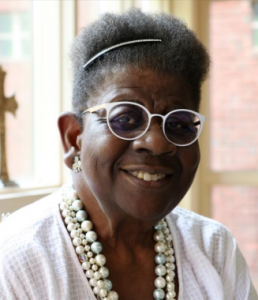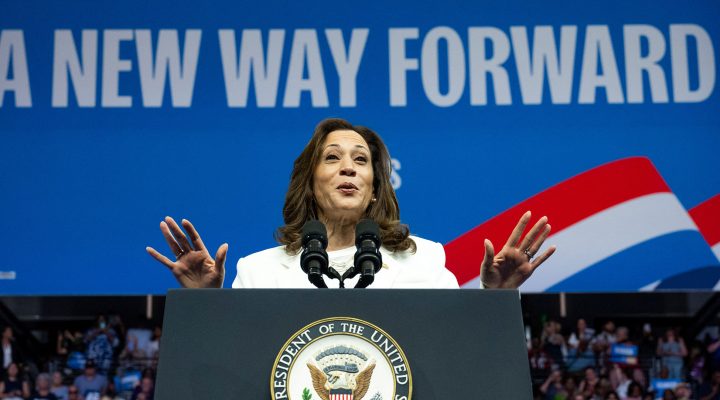One day in 1962, while sitting in my Arkansas seventh grade schoolroom surrounded by classmates, poor facilities, inadequate school resources such as a good library, science labs or a place to fix hot lunches, segregation and poverty, I made the grand declaration, “Someday I want to be president of the United States.”
My teacher was horrified enough by my declaration to take a considerable amount of time to explain to me that my idea was ridiculous and if I held onto such a nonsensical way of thinking I was going to end up never getting married and would have an unhappy life. The response she made to my daydream was cruel and quite unfortunate.

Catherine Meeks
I was 14 years old, but thankfully it did not stop me from continuing to have vision and hope.
So, last month when Vice President Kamala Harris stood before all of us who were fixated on her either in the Democratic Convention Hall, our televisions, phones and computers, I was transfixed on her also. I sat in tears. I remembered 64 years ago making that declaration for which I had been ridiculed by my teacher, and I felt affirmed in my daring to continue to dream of a day when a little girl like me could get what I thought was the biggest and best job in the world.
Today, as I listen to all the ways in which many are processing having this mixed race, Black and South Asian (Indian) woman at the top of the Democratic ticket for the presidency, it is both heartening and disheartening.
First, many of us are saying, “Yes indeed, it’s about damn time, as a matter of fact it is way past time.” It is wonderful to see the positive energy that has been released into the presidential election cycle that was not there before with President Joe Biden. It is good to feel hopeful that this woman can win, even though she does not have a worthy opponent.
But it is important to pay attention to the voices who wonder if she is qualified. They do not seem to realize she is one of the most qualified candidates who ever has run for president. I was quite unhappy to hear comments from a variety of political strategists who had worked in previous winning campaigns wondering if she could rise to the challenge. I wondered what fueled their great lack of confidence in this woman who has forged three successful political campaigns that resulted in her being a district attorney, attorney general, United States senator and now vice president when they had so enthusiastically worked for men with far fewer credentials.
Of course, it did not take me long to realize her credentials or the lack thereof are not the problem the naysayers are embracing. She is lacking maleness and whiteness, our supremacist culture’s most comforting credentials. She is female, and she is Black.
These continue to serve as major disqualifiers in the minds and hearts of far too many people in our country. Women and people of color do not have to be a candidate for the presidency to be placed in the “not quite good enough” category for no good reason except the discomfort caused to many men by the fact that an empowered woman or person of color is at the top of the leadership chain.
“Unfortunately, there also are women who are not comfortable with other women being in leadership positions.”
Unfortunately, there also are women who are not comfortable with other women being in leadership positions. We can hope this election cycle’s issues are clear enough for everyone to know it is time to move past sexism, racism, classism, ableism and all the superficial ways in which bigotry hides in our world trying to mask as a defensible response.
My biggest hope is that Vice President Harris represents the beginning of a new way to see in our country. I look forward to the day when there are only women on the presidential ballots, along with those who bring gender, racial and class diversity. It is important to imagine a day when all the elected officials up and down the ballot reflect the diversity of the country.
Perhaps this election season will help us with that because we have a lot of work to do in this regard and we are far away from getting a passing grade.
The work required lies in the challenge confronting us as a nation to accept ourselves as who we are, a nation of folks who came from somewhere else. The supremacists have practiced genocide and repression on the folks who were found here for so long until it has become easy for them to believe they were here first. Unless our heritage is indigenous, we are all descendants of folks who were not born here. We are living on someone else’s land. Putting the ones that were found here and not killed on reservations does not change the facts.
Our healing and hope lie in the possibility of stepping up to the challenge of allowing this country to become the America many before us have dreamed of seeing. A land capable of being for the brave and free and a land Frederick Douglass dreamed of when he challenged his listeners to allow “America to be America.”
“The freedom horse escaped enslavement and left the barn a long time ago and it is not coming back.”
Fannie Lou Hamer, the brave freedom and justice-seeking warrior from Mississippi, lamented during her lifetime that she was “tired of being sick and tired.” I am with you Fannie Lou; I want to live in the America that was imagined by the folks who were willing to take a chance on coming here and creating this flawed democracy with the hope of being able to live life better than when they were ruled by folks whose vision was too dim to allow citizens to be completely free.
And with the descendants of the enslaved and the indentured who did not have a choice about coming but held onto the desire to be free anyway. We can celebrate the fact that this land provided some small glimmers of hope for the realization of that desire in centuries past to be sustained and to grow stronger even to this present moment.
Vice President Harris is correct: “We are not going back.” The freedom horse escaped enslavement and left the barn a long time ago and it is not coming back. The hope of taking our freedom away will not be abided.
We are long overdue in responding collectively to the challenge to be brave enough and clear headed enough to interrogate ourselves about what really matters and what kind of lives we wish to live and making that a priority over divisiveness.
We know freedom, and we know it is better than not being free. We know that gender and skin color matter, but they are not the whole story.
I see in the candidacy of Vice President Harris not a Black woman running for president only, but a chance for our nation to turn its head toward a new way to see. A chance for America to be America.
Catherine Meeks was given the President Joseph R. Biden Lifetime Achievement and Service Award in August 2022; was listed by Georgia Trend Magazine as one of the 500 women to watch in Georgia in 2022; retired as the Clara Carter Acree Distinguished Professor of Socio-Cultural Studies at Mercer University; is an author, community and wellness activist and mid\wife to the soul. She previously served as founding executive director of Absalom Jones Episcopal Center for Racial Healing and currently serves as founder and executive director of the Turquoise and Lavender Institute for Transformation and Healing. She lives in Atlanta.
Related articles:
The powerful religious closing to the DNC | Opinion by Guthrie Graves-Fitzsimmons
Regarding election 2024: Eight things I see | Opinion by David Gushee
Vance is the most unpopular VP pick of the modern era


